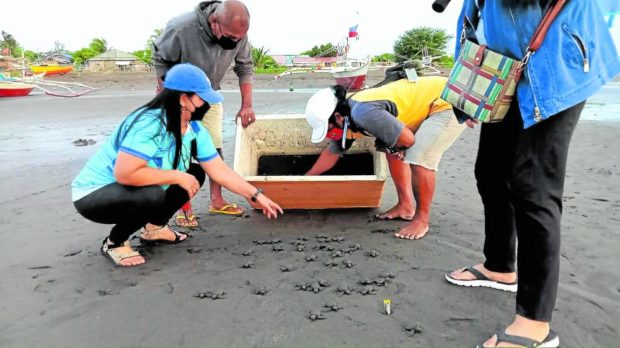
BACK TO THE WILD: A batch of olive ridley hatchlings is released into Tayabas Bay in Lucena City on Jan. 16, as coastal villagers take on the task of caring for sea turtles nesting in their communities. (Photo courtesy of JAY LIM/Tanggol Kalikasan)
LUCENA CITY—A total of 81 olive ridley (Lepidochelys olivacea) turtles nurtured by villagers were released into Tayabas Bay on Sunday, as the city’s coastal communities have taken part in the conservation of marine animals.
Nica Cabana, a fish examiner at the city agriculture office, said the turtles hatched at the shore of Barangay Ransohan. “They were taken care of by villagers themselves,” she said.
Cabana said that last year, some 70 olive ridley hatchlings were released in the nearby village of Barra.
The local government has been conducting regular information and education campaigns in the city’s coastal barangays about the value of marine resources and the need to protect them, she said.
Cabana said they were expecting that another batch of hatchlings would be released following the discovery of another nesting site in Ransohan.
Last week, at least 83 olive ridley hatchlings were also released in neighboring Sariaya town.
Positive sign
Tayabas Bay stretches from San Juan town in Batangas province to the towns of Sariaya, Pagbilao, Padre Burgos, Agdangan, Unisan, Pitogo, Macalelon, General Luna, Catanauan, Mulanay and San Francisco; and Lucena City in Quezon.
Jay Lim, project officer of Tanggol Kalikasan (TK), a public interest law office that advocates environmental protection, said that several baby turtles were also released in Mulanay town in November.
“It’s a positive sign that our local fishers are now aware of our fragile marine resources. Protecting the ‘pawikan’ (sea turtle) is for their own benefit,” Lim said.
According to local environmentalists, turtles lay eggs along the coastline of Tayabas Bay from October to December and stay on the beach for almost two months until the eggs are hatched.
The presence of pawikan, they said, indicates a balanced marine ecosystem and means an abundant supply of fish in the area.
Many residents in communities facing Tayabas Bay in Quezon used to keep sea turtles as pets while some consumed its meat and eggs.
TK has been conducting a campaign to educate the public about environmental and wildlife protection laws.
The Convention in International Trade on Endangered Species prohibits the commercial trade of olive ridley turtles, which are classified as “vulnerable” by the International Union for Conservation of Nature.
Republic Act No. 9147 (Philippine Wildlife Resources Conservation and Protection Act) also prohibits the hunting, selling, and killing of endangered species, including sea turtles.